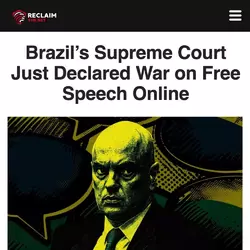
Xitter
Archive
Brazil’s Supreme Court just took a sledgehammer to digital speech. In a landmark ruling, eight of eleven justices voted to make social platforms like X, Facebook, and TikTok directly liable for user content flagged as “hate speech,” “anti-democratic,” or inciting violence; no court order needed.This obliterates Brazil’s prior standard, where platforms acted after judicial orders. Now, they must act preemptively or face legal consequences. The justification? The court claims that stronger intervention is “necessary to protect fundamental rights and democracy.”But here’s the reality: this sets a dangerous precedent for pre-emptive censorship at massive scale. Tech firms are alarmed. Conservative lawmakers are furious. Even the US is watching closely: the Trump administration is weighing sanctions and visa bans for officials like Justice Alexandre de Moraes, who’s already notorious for blocking X in Brazil...
Article
Archive
Eng Translated Ruling
Also attached.
Brazil’s highest court has handed down a ruling that significantly expands the legal liability of social media companies for content shared by their users, marking a sharp shift toward tighter controls on digital speech in the country.
The decision compels platforms like Facebook, TikTok, and X to swiftly remove posts that contain “hate speech,” incite violence, or promote so-called “anti-democratic acts” as soon as they are flagged, sidestepping the need for a court order.
This controversial judgment, passed by eight of the 11 Supreme Court justices, abandons Brazil’s prior approach, which held platforms accountable only when they ignored judicial orders to take down illegal content.
The court argued that this old standard “is no longer sufficient to protect fundamental rights and democracy,” claiming that more aggressive intervention is necessary.
The move is part of a growing trend in Brazil to clamp down on digital speech under the banner of protecting society, especially youth.
However, many voices warn that this ruling opens the door to dangerous pre-emptive censorship, forcing tech companies to police speech more aggressively than ever.
Conservative lawmakers have already raised alarm bells about the implications.
Tech firms have also expressed deep reservations about the ruling’s fallout.
The Trump administration has signaled it may impose visa restrictions on foreign nationals involved in suppressing speech by US firms and citizens. Secretary of State Marco Rubio recently indicated that sanctions could be considered against Brazilian Supreme Court Justice Alexandre de Moraes, who previously blocked access to X after Elon Musk defied court orders to shut down certain accounts.
At the GlobalFact 12 summit, three top Brazilian officials sought to defend the government’s aggressive regulatory push.
Addressing a gathering of international fact-checkers, Supreme Court Justice Alexandre de Moraes, Attorney General Jorge Messias, and Superior Electoral Court President Cármen Lúcia insisted that regulating online content is a necessary safeguard rather than censorship.
De Moraes declared, “We must always repeat that what is not allowed in the real world is not allowed in the digital world,” Poynter reported.
Lúcia drew an analogy between speech regulation and traffic laws, asserting, “Your freedom does not mean to be free to go the wrong way and crash into another car and kill another driver.” Messias likened technology to a tool that can either build or destroy, depending on who wields it.
Yet despite these statements, none of the officials outlined clear mechanisms for how such regulation would work without trampling on basic freedoms. De Moraes, who has played a prominent role in efforts to silence certain political voices and platforms, dismissed self-regulation as a failed experiment. Messias echoed this view, arguing that platforms are incapable of enforcing their own rules effectively.
Their remarks come as Meta, under mounting scrutiny, recently ended its controversial “fact-checking” partnership in the US, with CEO Mark Zuckerberg acknowledging concerns that the initiative had crossed into censorship.
Attachments
Last edited:
